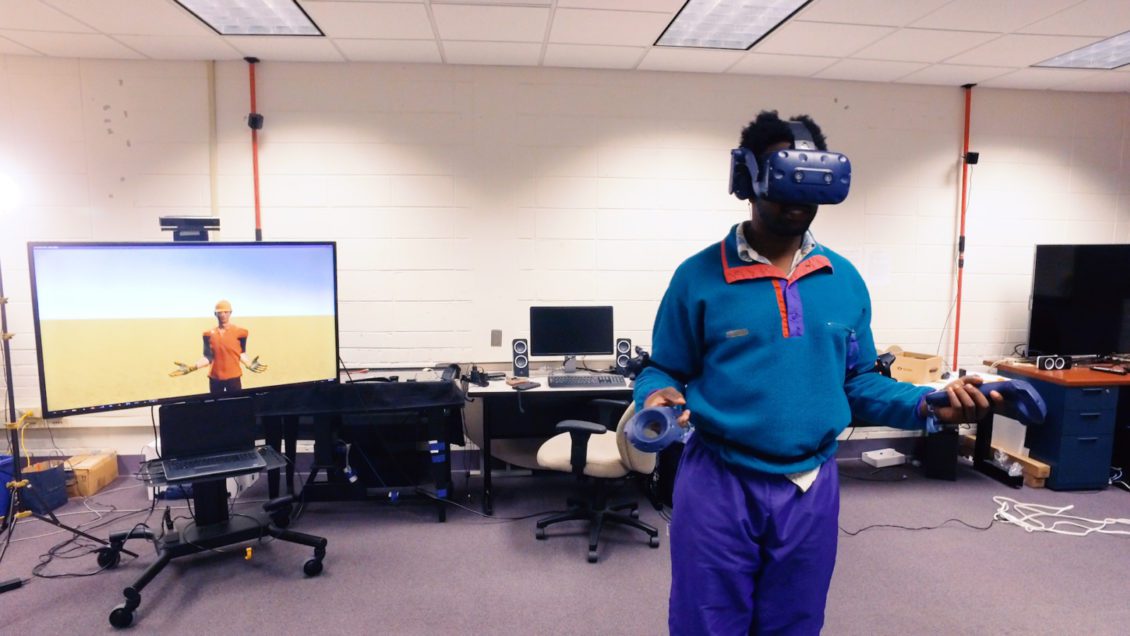Divine Maloney slipped a virtual reality headset over his eyes and was immediately transported from his Clemson University lab to a construction site where he started nailing together digital beams of lumber.
Later, he turned to talk to two virtual supervisors, Sam and Juan, who were standing next to two signs, one that said “Danger” and one with the Spanish translation, “Peligro.”
Maloney was demonstrating how he conducts research into stereotypes and biases in virtual reality– work that won him the Ada Lovelace Fellowship from Microsoft Research.
[vid origin=”youtube” vid_id=”leQ5zBzY0l4″ size=”medium” align=”right”]
The fellowship provides three years of funding for second-year Ph.D. students from groups underrepresented in computing.
“I’m super humble and super appreciative,” Maloney said. “With this comes a lot expectations to continue doing good research and to do research in areas that can help people who look like me.”
Doors are already opening for the 23-year-old who was born in Guyana and grew up near Jacksonville, Florida.
The fellowship will help pay for his travel to Barcelona, Spain where he will attend CHI Play, a prominent conference in his field. And this summer, he plans to work at Microsoft headquarters near Seattle.
Maloney’s research focuses on virtual avatars, the characters that represent users and that are controlled by their movements.
Avatars can affect computer users without them knowing, Maloney said. A very tall avatar, for example, can cause the user walk differently and to negotiate more aggressively than usual, he said.
Maloney said he would like to learn all that can happen and provide his results to content designers so they will know what to avoid when creating content ranging from video games to educational programs.
“I’m interested in social good– how research can help society right now or in the near future,” he said. “It’s also really important to think about who your research is impacting.”
When Maloney conducts the construction-site research, he asks his subjects to explain the work they have completed to the virtual supervisors. Maloney looks for differences in how the subjects interact with Sam and Juan as a way of measuring racial bias without explicitly asking.
Maloney received bachelor’s degrees in computer science and Spanish from Sewanee- The University of the South, where he played H-back and safety on the football team and served as captain.
He heard about Clemson’s excellent reputation for virtual reality research while interning at Vanderbilt University. Maloney is now conducting his research under Andrew Robb, an assistant professor in Clemson’s School of Computing.
Maloney is one of two Ph.D. students to recently win prestigious fellowships from large technology companies. Daricia Wilkinson, a third-year Ph.D. student, received a Facebook Fellowship.
Larry Hodges, interim director of the School of Computing, said the awards underscore that the school continues to attract top students and is garnering the attention of leading technology companies.
“I’d like to congratulate Divine Maloney and Daricia Wilkinson on their fellowships,” he said. “They are richly deserved and will position them for success. I also thank Microsoft and Facebook for their generous support of our students.”
Maloney said his No. 1 goal is to show that researchers don’t need to be buttoned up in a white lab coat or suit and tie. It’s a point he reinforces on his Instagram account, @vr_is_divine, where he is often pictured wearing Hawaiian shirts and promotes science and research.
“We have to show kids that research is cool,” Maloney said. “ It’s fun, and you can research whatever you want.”
Get in touch and we will connect you with the author or another expert.
Or email us at news@clemson.edu

